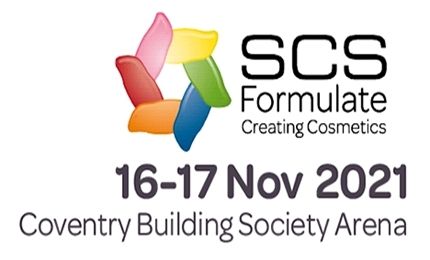
Earlier this month we attended SCS Formulate in Coventry, in search of the latest trends and up and coming innovations in cosmetics science and the beauty and personal care industry. SCS Formulate is a two-day exhibition and is the UK's largest event of it's kind focusing on raw materials, ingredients and formulation services in personal care and cosmetic products. As a prime manufacturer, these types of events are super useful for our innovation and lab teams to attend. The exhibition provides a unique opportunity to not only see the new and innovative trends and ingredients in the marketplace but also for networking. Having our key suppliers under one roof gives our lab and sales team the perfect opportunity to meet with key contacts and finally put a face to a name following a tough and isolating 18 months throughout Covid. As a business, our sales and business strategy has developed and it was important for our team to update suppliers of our future plans but also new requirements. Following our visit, we thought we'd quickly summarise our findings for anyone who didn't have the opportunity to attend.
Waterless Formulations
The trend derived from sustainability and creating more eco-friendly formulations within cosmetics and personal care explores waterless products. It's a trend we've seen on platforms such as WGSN & Mintel, but our team reports that it was fantastic to see some of these innovations come to life in sample form. A key arm to this trend is exploring Cytofruit waters.
Cytoruit waters are described as the result of a symbiosis between technology and sustainability and are fruit-derived waters that replace or substitute the use of demineralised water. Put simply, Cytofruit waters are active waters naturally processed by the fruit and bear all the richness of the plant. Defined as microbiologically pure, they show more biological benefits than distilled waters. As these fruit waters are obtained without flash distillation, the result is only natural processes from the purest juices.
Cyto fruit waters, provide a compelling and sustainable back story for brands and NPD.
Back to bar which explores solid product formats, was another trend that feeds into waterless innovations. In fact, Mintel states that 13% of UK consumers are interested in dry-use soap, bath and shower products, whilst there's been a 211% increase in the number of launches of bars and solid formats within the bath and body category.
Sustainability
As always sustainability is a key theme throughout most events and exhibitions, and SCS Formulate was no different. Aside from the above, we found a number of suppliers presenting upcycled raw materials and bi-products, which again presents an opportunity to include a back story throughout branding and product messaging. Some of our favourites included; Lucasmeyer Cosmetics Milky Bubble Bar, an 'indulgent syndet bar to clean while nourishing sensitive skin and conditioning hair with fineness & a soft creamy feel' and ROELMI HPC Lavender massage bar a 'solid massage oil with natural butters'.
Microbiome
The science of skincare is really at the forefront of consumers minds following the pandemic. Whilst Microbiome in skincare has been around for some time now, it's only more recently that consumers are starting to understand the science and logic behind the trend. Each individual has a unique network of Microbiata determined by DNA originally. When exposed to microorganisms and environmental factors, this can change the microbiome either beneficially to health, or instead increase risk of disease. The human skin has 1 billion microbes per square centimetre, whilst products with pre and probiotics in, help to feed and nourish the good microbiome and keep the skin healthy and balanced.
Hair & Scalp care
Another trend we've seen frequently come up on WGSN & Mintel over the last 12 months is how hair care is transitioning into scalp care, which originated in Japan and is now emerging in the US and EU. Scalp care trends are predominantly taking inspiration from skincare, using well-known key ingredients such as hyaluronic acid and Vitamin C infused into scalp and hair care products. According to Mintel; In China, 90+% of haircare product users agree that scalp care can improve their hair health or that haircare is as important as skincare (Mintel). Similarly, in Canada 27-30% of adults are concerned about age-related hair issues such as hair loss, grey hair and dryness; naturally, these consumers are more invested in the scalp care trend and how this new approach can benefit them.
Interestingly, whilst at SCS, our team gathered some useful data and statistics in regards to haircare and how the industry is catering for a more ethnically diverse market. For instance, users with afro hair make up 2% of UK population, whilst 10% of overall spend on haircare in the UK is on afro hair care products. That's an astonishing amount and provides an opportunity for haircare brands to explore new markets and products.
Key takeaways
- As expected, sustainability is at the forefront of new formulas and product innovations
- Waterless formulations take centre stage
- Scalp care has been on the rise and will continue heading into 2022
- Microbiome in skincare is becoming more familiar with consumers

